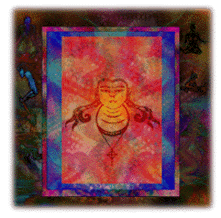

n the other hand, my dhamma-heart is drawn
again and again towards the depth of silence and solitude. I love figuring out how to unhook my mind
when it is painfully caught. I love when insight bursts out of the
stillness. I love equanimity, when the mind doesn't move. And I love the
idea that greed and hatred can be chipped away at to find freedom.

t's like suddenly waking up to realize I've
been sitting in a room with all the curtains drawn and there's a whole world outside there I had never
before noticed.

nce when I was meditating I began to
remember all my junior high school rejections: theater auditions I'd failed, people who wouldn't go out with
me. It all flashed by like a movie. But because my concentration was so
deep, I wasn't suffering with what could have been extremely painful
memories.


nowing how much I love the practice, I
sometimes question why I spend so much time thinking about my job and my love life. If I really want to
become liberated, why I am not an ordained nun? I
seriously question the message in American Buddhism that "you can have it all"--that
you can be free without giving anything up. I'm just not convinced that
teachings on dhamma in the context of family life, jobs, and sex aren't a
distortion of the practice. Is America's "Buddhism
Lite" really Buddhism?
How do I find balance?

'm not yet ready to ordain. Instead, I'm
exploring how to be in the world in a dhammic way. My search has led to the Buddhist Peace Fellowship's
Buddhist Alliance for Social Engagement (BASE), a
kind of domestic Peace Corps with a Buddhist twist. We place volunteers in service and
social action positions and provide Buddhist retreats, training, and
mentoring for them. I coordinate the volunteers and work with homeless
people in a health care clinic and at a domestic violence shelter.










